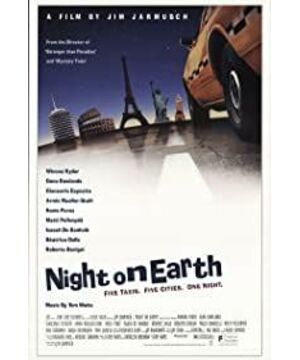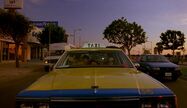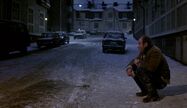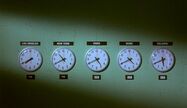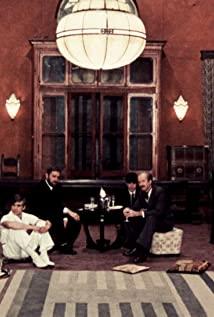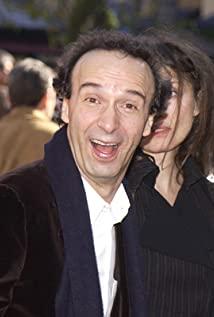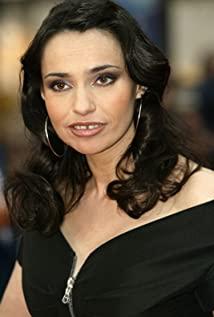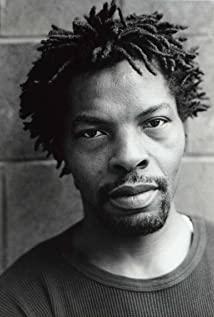at the same time: In Los Angeles, a scout spotted Cocky, the taxi driver who was driving her. However, the desperate and beautiful driver wanted to save money to become a mechanic, so unexpectedly calmly refused the scout's invitation.
In New York, a former East German clown became an incredible taxi driver. He was like a fish in the water between two black passengers who were chattering and cursing at each other. Not only did he complete the task of carrying passengers with poor car skills and ignorance of the road, but also acted as a lubricant for the two passengers with his unique comic style.
In Paris, the unlucky taxi driver (the band-aid on his forehead was the best footnote he encountered that night) carried a blind woman. The driver's ridicule and sympathy for the blind woman was arrogantly fought back by the French girl. In the end, he ironically had a rear-end collision and involuntarily offered the most humble and decent compliment to the woman.
In Rome, the driver played by Bernini was pious but confessed his horrible sexual experience to the priest regardless of occasion. The stimulation caused the priest to ascend to heaven in indecent words.
In Helsinki, my friend used Aki's experience to elicit the unfortunate past of the taxi driver. The three people sighed, only the person involved, Aki, stayed out of the matter without knowing it.
From the plot point of view, these five stories are trivial and irrelevant. As a whole, the five stories are linked together by relying on simultaneous occurrences and co-occurrences in the taxi. Although it has the same simultaneity and the same space, "Earth Night" obviously fails to create a sense of mystery like "Mysterious Train"; on the other hand, several stories have inherited the "Heaven Moying" style of suppressing first and then rising. The sudden change of mood makes each story quite interesting and intriguing. However, as a whole, we still want to ask: What does "Earth Night" really want to say?
I think it can be understood a little bit from the character of the characters. In Cocky, the clown, the Roman driver, the blind girl, and the alcoholic, we can all feel some of the same traits: honest, optimistic, self-centered, full of recognition of ourselves, and full of trust in the outside world. Therefore, the Los Angeles driver dared to share her small dream with the scouts, the East German clowns could drive passengers with a carefree, and the blind girls in Paris could lead a normal life with pride. This almost innocent temperament made them so different that Cocky easily became the savior of the scouts, and the clown inadvertently gained the love of passengers and audiences. After reading the third story, I even exaggeratedly thought that they were the secular comedy version of the Joseph family in "The Seventh Seal" (the five people obviously can see the Virgin Mary). From this perspective, the conversation between Bernini and the priest (if counted as a conversation) is comically and vaguely brought with a certain kind of confrontation: the two sides of the confrontation can be regarded as the driver representing "innocence and saving mankind" and representing "faith" for the time being. The priest of "saving mankind". In front of the driver's sincere chatter, the priest and his religion looked stiff, pale and vulnerable, and it was laughable.
It is worth noting that there are character settings. Blind girls can't see the world when they come, clowns and Americans are culturally separated, alcoholics are already delirious in the usual sense, and Cocky and Bernini are obviously lacking in education. These characteristics should belong to the weaknesses of each of the five people, but under the meticulous conception of Jia Muxu, they have instead become a means to filter out the miscellaneous, making the characters more simple and interesting.
"Earth Night" has the usual characteristics of Jamux's movies. The plot is simple and does not convey difficult thinking. Instead, it expresses it with the keen sense of the poet and grasps the moment of insight. When you want to deliberately grasp it, you discover the theme of the movie. Erratic. This is like the end of "Earth Night": when we watched the five short stories told by the director that happened in the dark, we inadvertently discovered that the sky was already bright. On the surface, Jamusch's films are so simple that they lack ideas or even lack themes, but at the same time they tend to be refined and perfect in terms of technique and technique, and they are lingering in imagery and artistic conception.
Jia Muxu is a man who writes poems in movies.
View more about Night on Earth reviews


